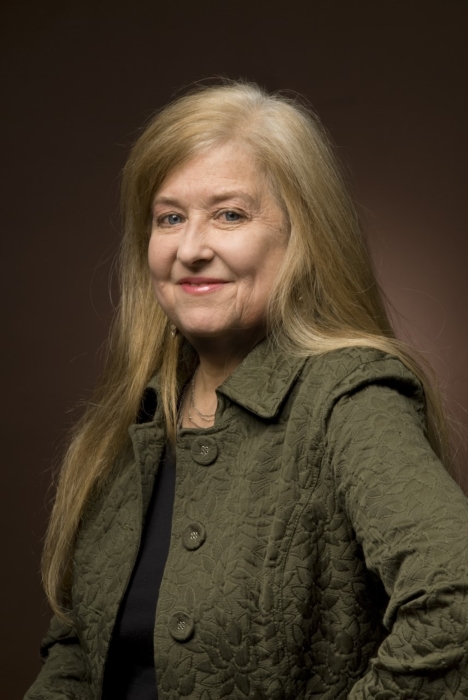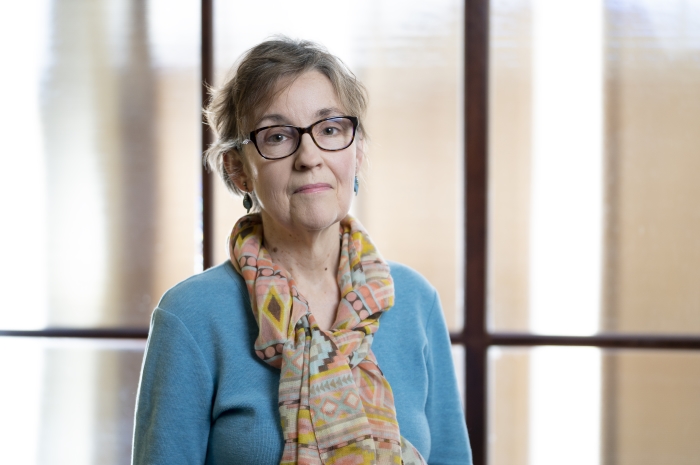Local poets in spotlight in April
By Alison Rooney
Poetry readings are a staple of libraries and a frequent offering at other arts institutions. With the announcement of Celebrating Poetry with Three Hudson Valley Poets, a reading scheduled for 3 p.m. on Saturday, April 6, at the Butterfield Library in Cold Spring to mark National Poetry Month, we wondered how comfortable poets are with reading their words.
We asked Jo Pitkin (who organized the event), Lucia Cherciu and Raphael Kosek, for their thoughts, which have been condensed below. We also asked them each to share a poem.
Kosek, the newly appointed Dutchess County poet laureate, is the author of the forthcoming American Mythology. She teaches English at Marist and Dutchess Community College. Pitkin, who lives in Nelsonville, is the author of the forthcoming Village: Recession. She has an MFA in poetry from the University of Iowa. Cherciu, who came to the U.S. from Romania in 1995, is the author, most recently, of Train Ride to Bucharest. She is a professor of English at SUNY Dutchess.
Do you write poems to be heard? 
Kosek: Absolutely! I read my drafts aloud to “hear” how they work, although some poems are more sound-oriented than others. Reading for an audience is an even better way to discern if a poem works, so I often read new poems to get a sense of how they “play.”
Pitkin: I wore out a print copy of Roget’s Thesaurus trying to find the right words with the right sounds. I like to use all those fun sound devices you learned about in school like assonance, consonance, alliteration, repetition. Decades ago, I started allowing my poems to rhyme even though it wasn’t fashionable. I always let the poems do what they want to! Long ago, the first poems were recited aloud, so I like to honor that oral — and aural — tradition.
Cherciu: I always listen to the music of the words as I write. The rhythm and cadence guide me. This comes more naturally to me in Romanian. When I revise, I read a poem aloud to figure out the length of each line, the unit of breath.
Are poets the best readers of their own words?
Kosek: It depends on the poet. I have heard a famous poet of prodigious output and awards read his work in a steady, inaudible mumble.
Cherciu: I don’t think all poets are good at reading their own work, despite their best intentions. Some poems are better on the page, while other poems are all music.
Getting the Word Out
The two other public libraries in the Highlands are also hosting readings in April.
In Garrison, the Desmond-Fish Library will host a gathering of regional poets from 2 to 4 p.m. on Saturday, April 13, to kick off a new monthly Hudson Highlands Poetry Reading Series. They include Pitkin and T.R. Hummer of Cold Spring, Mary Newell of Garrison and Edwin Torres of Beacon.
In Beacon, the Howland Public Library will present a reading at 6:30 p.m. on Thursday, April 18, with the city’s poet laureate, Peter Ullian, as well as two of his predecessors, Larry Sansone and Tony Pena, and Kosek.
Many people might find the idea of a reading intimidating and/or soporific. What would you tell them?

Kosek: It depends on the audience and the ability of the poets to be “reader-friendly.” You have to get a feel for your audience. Are they all poets? Are they polite folk coming out to support a book signing, an organization? Poetry can be intimidating if people are not overly familiar with it, and certainly, poetry in our society is not the go-to reading for most folk. It helps for the poet to kibbutz with the audience. It’s unpardonable to read poem after poem without telling them how it came about. I hate readings where someone gets up, reads poem after poem, and doesn’t even look at the audience. Humor also goes a long way.
Pitkin: I’m sure a poetry reading sounds as much fun as a root canal to many people. But a reading can be dynamic and fresh because it’s live. Writers and audiences get to interact. It’s the difference between reading a play and seeing it performed.
What advice would you give a poet embarking on his or her first readings?
Pitkin: Practice. Stick to the time limit. Expected the unexpected. Mark the pages so you don’t have to shuffle looking for what you want to read. Have fun!
Kosek: Read the poems aloud to your dog or cat. See how the words feel in your mouth. Jot down something you might want to say about the poem. Don’t record yourself reading; you won’t like your voice. Consider your audience — young people, older people, people familiar or unfamiliar with poetry — and choose poems accordingly. If you are the featured reader, don’t read for more than a half-hour. Poetry is intense and requires a certain kind of attention, and you don’t want to wear out your welcome.
Cherciu: Support other writers by attending their readings, buy their books and be a good literary citizen. I pay attention to writers’ delivery and try to learn from it, whether it’s aspects I want to emulate or rhetorical pitfalls I want to avoid.

What is the role of a poet laureate, and why is it important?
Kosek: A laureate’s role is to be an ambassador for poetry, bringing it out there, putting it on display with pleasure, showing people that the right words in the right order matter, and give pleasure and insight into the human condition. When so much is communicated digitally, we need poetry to slow us down, to show that there is another way of thinking and being than staring at a screen.
The Mollusk
By Jo Pitkin
The mollusk we find in Scituate
where the sea flattens and releases
is not Ponge’s oyster but is, as
his is, a world stubbornly closed.
On a far strand bitten with wind,
you pry and pry. That viscous
mass you cannot see does not yield.
Its curved, hinged lid stays shut.
As you clutch its whitish valves,
I see you not as you are, apart,
but as you once were: observant
boy, determined boy, galled boy
scooping, cupping, keeping
the shallows, who will not let
anything go. Not the sharp stalks,
the yellow marsh, the turn of the shore,
not the heavy rope of surf.
Not the awful beautiful
pearl of the possible born of
want, water, grit, salt, luck.
Learning A Name
By Lucia Cherciu
When I was a child, my father used to ask me
the name of everyone we met, and when I failed
to remember, he was disappointed and he’d say
that I took after my mother. Later, I learned
that learning a name traces a ritual like stencil
on light, repetition of gestures that matter.
Soul and breath. Sacred as rhyme in a prayer,
naming builds a ladder of salt, soothes sobbing.
Like walking on the same trail, abates fear
and restlessness: every step, a salutation
of a tree whose name I finally discover as if
its wood and leaf burn me. To a weary traveler
walking at dusk, having learned a name will offer a ride
on a deserted road even before having to ask.
The Miracle Flower
By Raphael Kosek
Our white bells
trumpet the miracle
of large, open whiteness.
Don’t you see how
We fill this world,
her tired canvas,
with buoyant promise?
We are the mind unjumbled,
excellent voice that calls
the dark spin of your life
into question. Our opening
shuts the door on doubt,
our lifting heads wag in blue wind,
gracious leaves curl in concert
with the white stretch of our throats.
We are never far from ourselves
like you,
yet we lean into blue sky
and that is miracle enough.
